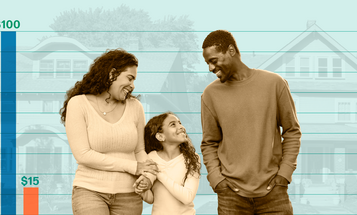
What Causes Racial Economic Inequality — and What Doesn't
Doing “everything right” is still not enough for black and Latino households to accumulate as much wealth as their white counterparts.

Donald Trump — who founded his campaign on an appeal to white racial anxiety and began his presidency with an immigration policy that discriminates on the basis of national origin — is unlikely to put forth serious policy proposals on reducing racial and ethnic inequality. Instead, many fear that his administration will promote policies that further expand the nation’s already vast and growing racial wealth gap.
To effectively oppose these policies, and to push for better alternatives at the state and local level, Americans need clarity on the causes of racial economic inequality and on which policies will and will not reduce it. That’s why Demos and the Institute on Assets and Social Policy at Brandeis University developed the Racial Wealth Audit and are working on a series of papers analyzing the racial wealth gap and how policy affects it.
The first step is understanding the dimensions of the wealth gap. Our new analysis of data from the Survey of Consumer Finances reveals that the median white household possessed $13 in net wealth for every dollar held by the median black household in 2013. That same year, median white households possessed $10 for each dollar held by the median Latino/a household.
The causes of the racial wealth gap are clear: centuries of unjust public policies, from slavery to segregation to redlining, allowed white households to accumulate wealth through opportunities that were systematically denied to (and frequently came at the expense of) people of color. The outcomes of past injustice are carried forward as wealth is handed down across generations and are reinforced by ostensibly “color-blind” practices and policies in effect today.
Yet many popular explanations for racial economic inequality overlook these deep roots, insisting that wealth disparities must be solely the result of individual life choices and personal achievements. If only people of color changed their behavior in some key way, this line of thought contends, racial wealth economic inequality would vanish. Our new report, "The Asset Value of Whiteness," provides data indicating that it is false.
Drawing on data from the 2013 Survey of Consumer Finances, we find that white adults who don’t graduate high school, don’t get married before having children, and don’t work full time still have much greater wealth at the median than comparable black and Latino adults — and often have more wealth than black and Latino households that have married, completed more education, or work longer hours. Differences in consumption habits also cannot explain the wealth gap; we look at academic research finding that white households spend more than black households of comparable incomes, yet still have more wealth.
Doing “everything right” — making all the optimal life choices to build wealth and get ahead, despite obstacles — is still not enough for black and Latino households to accumulate as much wealth as their white counterparts.
Consider our findings on single parents. In another recent report, "The Parent Trap," I examined the economic insecurity of families with young children, looking at the host of pressures that bear down the most fiercely on single parents who struggle to both care for their children and earn a living to support them. Single mothers face high rates of poverty and unemployment. Yet white single mothers nevertheless benefit from intergenerational transfers of wealth at much higher rates than households of color. As a result, as much as single mothers struggle, the median white single parent has 2.2 times more wealth than the median black two-parent household and 1.9 times more wealth than the median Latino two-parent household. Family structure, we conclude, does not drive racial inequity, and racial inequity persists regardless of family structure.
Addressing the racial wealth gap – and ultimately, building a more equitable society – will require a shift in focus away from individual behavior toward policy that confronts structural and institutional racism. Next Monday, February 13, IASP and Demos will launch RacialWealthAudit.org a new website containing information on our Racial Wealth Audit, a framework to help evaluate a potential policy’s impact on the wealth gap.




